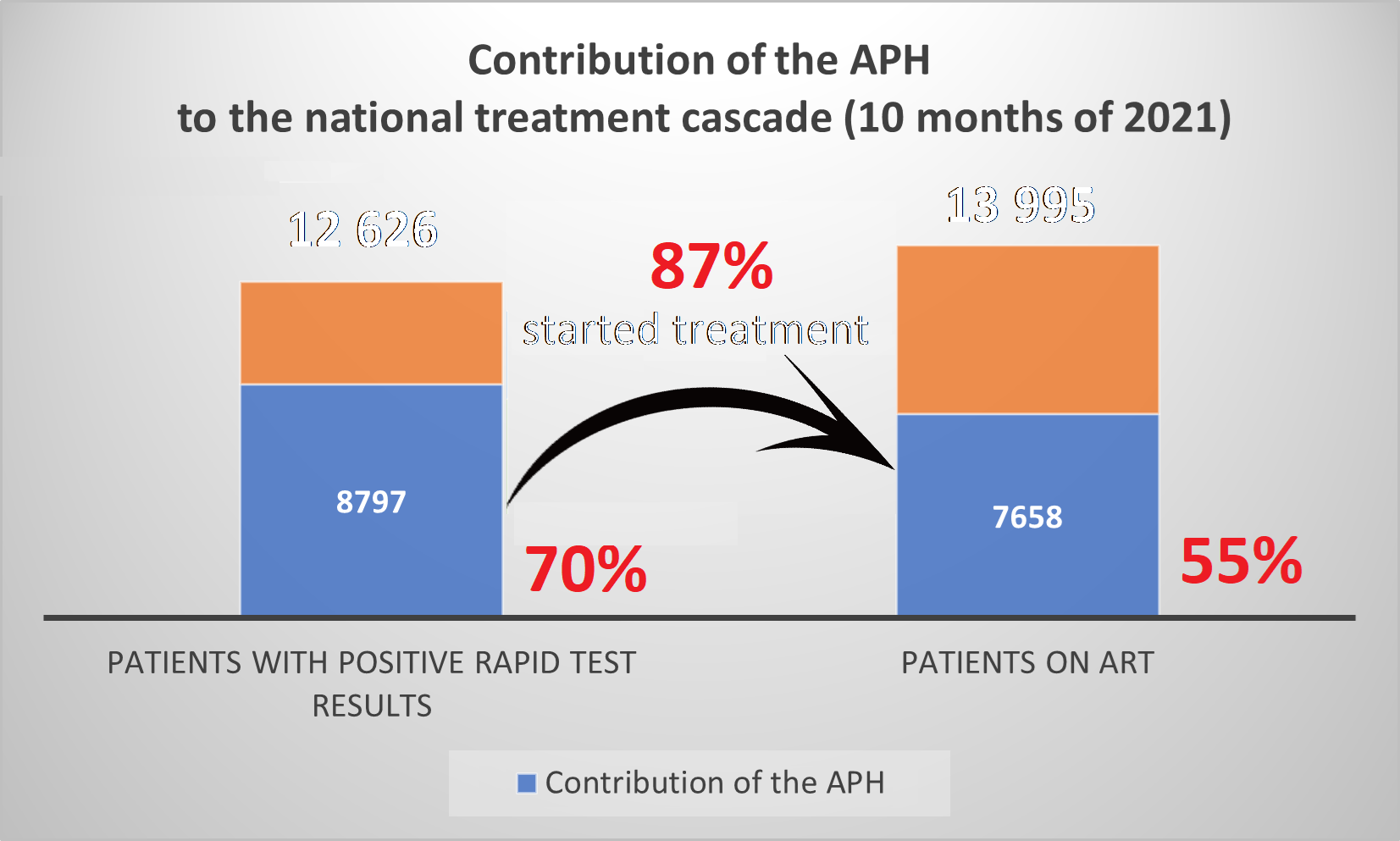In 21 years of work, Alliance for Public Health has provided for detection of 70% of new cases of HIV in Ukraine
Statement on the occasion of the World AIDS Day
Despite the challenges caused by the COVID-19 epidemic for a second year in a row, we still insist that a smart innovative approach to prevention with involvement of traditionally poorly reached populations with a due consideration of specifics of working with them makes achieving United Nations’ ambitious 95-95-95 strategic target for HIV/AIDS1 totally realistic.
From the very first days of our work in Ukraine, this topic has been the key one for the APH, and it is not without the reason that on the 1st of December the APH celebrates its 21 years of intensive and very interesting work. We have always been and still remain at the frontline of fighting the epidemics: in 2021, 70% of all newly detected HIV cases in Ukraine were detected by the Alliance, and our contribution to the cascade of treatment was as high as 55%!

We started our work back in those years when virtually all HIV response activities were funded by international donors, and were able to witness how the state was becoming a powerful actor in this area. And now, when some of the services (such as prevention, care and support) are already funded by the government using models created by civil society organizations, we remain a strategic partner in the national response to the epidemic, always willing to give a hand whenever expert support or implementing and piloting innovative models are required. In 2021, the APH has started implementing a new component, “Reaching hard-to-reach key populations” using the peer intervention model, among key population. The goal is to track social connections in key populations and improve their involvement in state-funded basic guaranteed prevention programs. Activities implemented by the APH are complementary to the prevention programs funded by the state, which allows the clients to receive extra services not included in the basic package. A good example is the format of the HCV treatment program for HIV-positive members of key populations implemented in 2021, where the state and the APH act as implementing partners. Under this model, the state procures and supplies medicines, while the APH finds patients and refers them to HCV diagnosing and treatment, providing also for social support and information. Based on this model, in 10 months of 2021, more than two thousand of HIV-positive patients have received a comprehensive service package, including 1.6 thousand who have already completed the treatment.
Thanks to implementation of a number of innovative projects, HIV service cascade for people with drug dependence has improved significantly: from 58-91-73-74 (aware of the status – linked to care – receiving ART – achieved undetectable viral load) in 2017 to 64-94-92-82 according to a bio-behavioural study of 2020.
The APH remains at the frontline of supporting patients of substitution maintenance therapy: of 16478 persons receiving the treatment, 5.6 thousand (33%) receive psychosocial support, which has led to reaching a high figure of 95.6% of HIV+ SMT patients on ART. We also advance pre-exposure prophylaxis services: thanks to the social support services, in the first 10 months of 2021, almost 3000 persons have started PrEP, which is an important step for preventing HIV. 130 thousand young people have received information and counselling on harm reduction and sexual health on Drugstore, an innovative digital platform.
25 mobile ambulatories of the APH successfully provide HIV/STD prevention services to members of key populations in remote towns and villages, in the night, and during the lockdown, moving the services closer to clients.
For a second year in a row, we have been working during the pandemic, yet it does not restrict our activities; instead, it makes us develop new ways and model of work. Adjusted working hours, moving activities outdoors, appointments, queue management, providing medical masks and disinfectants to staff and clients, remote counselling — those were the methods to ensure uninterrupted provision of HIV prevention services in 2021. Thanks to advocacy activities of the APH and thorough work with public and non-government partners, almost 90% of SMT patients started receiving takeaway drugs during strict lockdown, which allows reducing the risk of treatment interruption when epidemic response measures are levelled up. Some new activities are introduced: transporting clients to healthcare facilities, delivery of PrEP drugs by post, providing support and home nursing to clients with disabilities, supporting key population members receiving outpatient treatment of COVID-19 and being on self-isolation.
The APH has made a significant contribution to HIV response on the international level as well! Under Fast Track Cities initiative, in January-June 2021, in 12 cities/regions in Eastern Europe and Central Asia, the number of diagnosed PLHIV has increased by 14%, and the number of PLHIV on ART has grown by 12%. Despite competition for resources with other fields of healthcare, national funding of HIV/AIDS programs has been increased: for the first time ever, Tajikistan has provided funding for social contracting of support for ART patients ($11.5 thousand), and in North Macedonia, advocacy helped achieving a 42.5% increase of funding of the AIDS program in 2022 (from EUR 1.42 million to 2.02 million).
On the World AIDS Day, the APH reaffirms its commitment to fighting the epidemic and its willingness to continue being an active partner to the state and the international partners in producing effective ways to implementing comprehensive HIV prevention programs and ensuring maximum state funding for them!
1 According to the Fast-Track strategy of the UNAIDS, by 2030, 95% of HIV-positive people are to be aware of their status, 95% are to have started antiretroviral therapy, and 95% of those receiving the treatment are to have achieved maximum viral suppression (when the viral load is undetectable).

